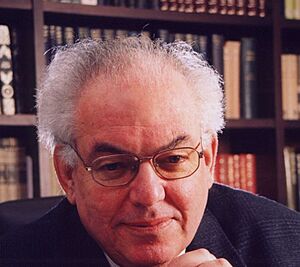David Hartman (rabbi) facts for kids
Quick facts for kids
Rabbi
David Hartman
|
|
|---|---|
 |
|
| Rabbi of Congregation Tifereth Beth David Jerusalem, Montreal | |
| In office 1960–1971 |
|
| Founder of the Shalom Hartman Institute, Jerusalem | |
| In office 1976–2013 |
|
| Personal details | |
| Born | September 11, 1931 Brooklyn, New York City, U.S. |
| Died | February 10, 2013 (aged 81) Israel |
| Nationality | American-Israeli |
| Alma mater | Yeshiva University, Fordham University |
| Occupation | Rabbi, philosopher, author |
| Known for | Founder of the Shalom Hartman Institute |
David Hartman (born September 11, 1931 – died February 10, 2013) was an important American-Israeli Jewish leader. He was also a philosopher, which means he thought deeply about life's big questions. He started the Shalom Hartman Institute in Jerusalem, Israel, and wrote many books about Judaism.
Contents
About David Hartman
David Hartman was born in Brooklyn, New York. He studied at several Jewish schools, called yeshivas. In 1953, he became a rabbi, which is a Jewish religious leader. He got his rabbinical ordination from Yeshiva University in New York.
He also studied philosophy at Fordham University. In 1971, Hartman moved to Israel with his wife, Barbara, and their five children. Moving to Israel is called aliyah in Hebrew. He passed away in Jerusalem in 2013 when he was 81 years old.
His Work and Teaching
David Hartman worked as a rabbi in New York and then in Montreal, Canada. While in Montreal, he also taught and studied at McGill University. He earned his Ph.D. in philosophy there.
Founding the Shalom Hartman Institute
In 1976, Hartman started the Shalom Hartman Institute in Jerusalem. This institute is a place for Jewish learning and discussion. His goal was to help people understand Judaism better. His son, Donniel Hartman, later became the president of the institute.
Hartman also founded the Charles E. Smith High School in Jerusalem. This school has separate programs for boys and girls. The girls' program is called Midrashiya.
Teaching and Advising
For more than 20 years, Hartman was a professor at Hebrew University of Jerusalem. He also taught as a visiting professor at universities in California.
He advised important leaders in Israel, including the Minister of Education. He also advised several Israeli prime ministers. He helped them think about how different Jewish groups could get along. He also worked on how Israel could connect with Jewish people living outside of Israel.
David Hartman's Ideas
Hartman believed that moving to Israel was key to his mission. He wanted to help different Jewish groups understand each other. He also wanted to build a more accepting society in Israel.
He strongly believed in religious pluralism. This means respecting and accepting different religious beliefs. He thought this was important for Jews and for relations between different faiths. His ideas often encouraged open discussion within Judaism.
Books by David Hartman
David Hartman wrote many important books. These books explored Jewish thought and tradition.
Some of his well-known books include:
- Maimonides: Torah and Philosophic Quest (1976)
- A Living Covenant: The Innovative Spirit in Traditional Judaism (1998)
- A Heart of Many Rooms: Celebrating the Many Voices Within Judaism (1999)
- Israelis and the Jewish Tradition: An Ancient People Debating Its Future (2000)
- The God Who Hates Lies: Confronting and Rethinking Jewish Tradition (2011)
He won awards for his books, like the National Jewish Book Award. He also received the Leah Goldberg Prize for the Hebrew version of A Living Covenant.
Awards and Honors
David Hartman received many awards for his work.
- In 2000, he was given the Avi Chai Prize.
- He received the Guardian of Jerusalem Prize.
- In 2003, Yale University gave him an honorary doctorate.
- In 2004, he received another honorary doctorate from Hebrew Union College. He also got the Samuel Rothberg Prize for Jewish Education.
- In 2008, he received an honorary degree from the Weizmann Institute in Israel. This award recognized his efforts to make Judaism more vibrant. It also honored his vision for a more accepting Israeli society.
 | Aaron Henry |
 | T. R. M. Howard |
 | Jesse Jackson |

